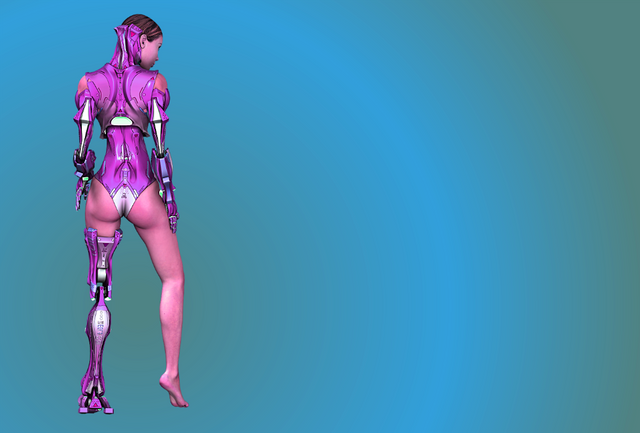The Robots Are Coming: Synthetic Ascension And The Power Of Touch
Some say that the synthetic ascension of the human race is an inevitable path for us. That is to say the point at which we break free from the slow repressive grip of our biological evolution using technology is a dream becoming reality.
Melissa Loomis's name may one day be mentioned in the same breath as Neil Armstrong or Christopher Columbus. Even though Loomis was an accidental pioneer, she can still claim to hold that particular title.
The 43 year old from Canton Ohio is a single arm (at the elbow) amputee. She lost her arm to infection after a raccoon bit her whilst breaking up a fight between her dog and the vicious little critter.
Being bitten by a raccoon is of course not the thing that will put her in the record books. Rather what has happened to her since that fateful summer afternoon in 2015.
Loomis has become the first person on earth to feel sensation via a prosthetic robot arm. In a technique called targeted sensory reinnervation, TSR for short. Loomis's nerve endings were rewired so that once she wears a device at her elbow, she can actually feel what her robot arm is feeling.
The Path To Touch
Six years ago in 2012 a postdoctoral student named Max Ortiz Catalan announced that he had developed a technique which would allow amputee patients to control robotic limbs with the power of their mind.
This of course was welcome news for many. The area of prosthetic limbs had not changed much in the preceding one hundred years. Apart from small design and material differences, a prosthetic limb made in the year 2000 was identical in function to one made in 1900.
By 2013 the first person, had received the world's first fully functional robotic prosthetic limb. Johnny Matheny of Port Richey, Florida who had his arm amputated eight years earlier due to cancer, suddenly had an arm again. Not just any old prosthetic, one that he could move simply by thinking about it. Just like his other undamaged arm.
However, unlike his undamaged arm, Matheny could feel nothing with his prosthetic. In this respect controlling his arm must have felt akin to operating a mechanical digger. Completely functional and useful, yet as in with the arm of the digger, a lack of sensation alerts the user to the fact that the limb is not a part of them.
So barely have we had time to catch our breaths from such a monumental breakthrough, and the next breathtaking leap forward occurs.
Loomis has not had the arm attached to her yet, though she can sit in a room with it on a stand and feel exactly what her robot hand can feel.
She can even feel it being lightly tickled. Making her the first person of all the billions of people that have born and died in human history. To have a fully functioning limb that is not attached to her body.
Synthetic Sensation A Gateway To Understanding
When developing AI systems, one of the first thing the developers do is to try and get the system to mimic and understand some aspect of human behaviour.
For instance the AI within Tesla cars attempts to understand and mimic driving patterns. The one running the Amazon engine tries to understand our buying patterns, in order to exploit them for capital gain.
The problem with these systems, is that we ourselves don't fully understand them. Things that we take for granted turn out to be complex problems that take years to teach a computer to do.
Look for instance at the problem of walking, robot engineers attempted to create a bipedal machine that could walk like a human being. Even the most advanced robot in this field Asimo, cannot walk with the absolute silky grace that a human being can.
The advantage of a system like touch, is that it is relatively simple. Once the mechanics are in place, you don't really have to teach a robot what touch is, it directly experiences it for itself.
This I feel will be the one thing that allows artificially intelligent robots to empathise with us. For them to experience the world as we do via sensations such as touch. They will be able to understand why a baby and a battery should be handled differently. They will know why and how we feel pain, because they too will feel that very same pain.
Ascension Symphony
As we surge ever forwards into the 21st century and beyond, the lines between human and machine will continue to blur. As this happens our understanding of each other will grow.
They will know what it is to be human, and in turn we will understand what it is to be machine. Perhaps even the term machine as far as AI is concerned will become obsolete. As it won't fully encompass everything that a synthetic intelligence might be.
Maybe they'll consider it racist to call them machines. After all, any definition of a machine must include some kind of mindlessness.
Plus of course we ourselves are slowly transforming into cyborgs, melding technology with our biology in an attempt to become better, stronger and healthier.
Perhaps if you were to jump forwards in time right now to another one hundred years, you might find that the human race is unrecognisable to the one you see around you today. Maybe you would call that 22nd century human a cyborg or a robot. One thing is for sure though, whatsoever you call him or her, they will not be like us.
Perhaps the Melissa Loomis moment will be looked back upon as the start of our synthetic ascension.
Sources:
Florida Man Becomes First Person to Live With Advanced Mind-Controlled Robotic Arm - Futurism.com
Max Oritz-Catalan - Google scholarly citations
We’re about to get prosthetics that can not only move for you but feel for you - Qz.com
The beginning of ascension?
WHAT DO YOU THINK ABOUT SYNTHETIC ASCENSION? DO YOU BELIEVE THAT IT IS WHERE THE HUMAN RACE IS HEADING FOR BETTER OR FOR WORSE? IS IT THE ONLY LOGICAL STEP FOR US, OR WILL WE REGRET LEAVING OUR BIOLOGICAL ROOTS BEHIND?
AS EVER, LET ME KNOW BELOW!
Title image: Creative Commons License Pixabay


This post has been rated by the user-run curation platform CI! In this platform users are able to manually curate content. This is done regardless of Steem Power, for both rewards and vote size calculation.
Join in at our site here!
https://collectiveintelligence.red/
Or join us on discord to interact with the community!
https://discord.gg/sx6dYxt
This post was submitted for curation by: @anevolvedmonkey
This post was given a rating of: 0.8288713818382841
This post was voted: 92.53%
I think it's definitely a good path ☺
Of course I'd rather be an ever replicating satellite drone able to spread across the universe and grow as an unified Hive Mind, but that's a tad more difficult XP
Being able to feel remotely is definitely going to be hijacked by one particular industry for sure 🔞...
But other than that it's also going to open a lot of possibilities !!
Posted using Partiko Android
I think we will function as a kind of pseudo-hive, once we're in the cloud.
I am so surprised that it took you to point this out in order for my gutter mind to finally go there! 😂🤣😂🤣😂🤣
Cg
Pseudo hive for the win !!
Did you read the summary of that 3 person brain to brain communication experiment that came out recently, the one using pseudo Tetris and phosphenes ?
Posted using Partiko Android
NO!?!!!!????😲😲😲
Literally scrambling for Google now!!!! Thanks for the info!!!
The future is now!!!! 😁😁😁
Cg
Wonderful fiction material, thanks you gave me a couple of directions where to take a short story :-)
Awesome! Glad I have been your muse for the day 😁😁😁
Make sure to let me know when you write it, would love to see what I've inspired!
Cg
I hope so. Bring it on! I wonder what we'll see in our life times...
Bring it on indeed! There are many more wonders in store for us 😁
Cg
@cryptogee,
It's a fascinating story and a truly amazing breakthrough.
As we've discussed before though, there is an infinite difference between sensing and "thinking." As you mentioned in your article, walking is so difficult for robots because it involves coordinating a multitude of actions that we do not understand ... that is, we don't know how we do it.
And, keep in mind that even in the case of this breakthrough, it is the woman's brain processing what the sensory input "means" ... not a computer. This breakthrough is really about having created "an electronic interface with the human nervous system" ... which is by itself bloody incredible.
But "thinking" is many orders of magnitude in difficulty beyond walking. "Computers" may appear to be thinking, but they're not, at least not as that termed is defined for humans. Indeed, they're not even close.
A computer playing a game of chess applies an inordinately complex series of IF/THEN statements. And while it may appear to be "playing chess," this requires torturing the meaning of the word, "playing."
It has no awareness of "playing chess," nor any understanding why anyone would "want" to play chess, or for that matter, why anyone would want to "play." Or what "want" is. It derives no "pleasure" from winning a game of chess, nor feels any despair at losing it.
Thinking requires consciousness and we haven't the faintest idea how the human brain achieves such phenomenon. What does seem very likely, however, is that consciousness in an "emergent property." That is, something ineffable, a qualia, that is a consequence of the physiological actions of our neurons ... like "wetness" is to water.
Of course, all this may be besides the point. If artificial intelligence becomes a "good enough facsimile of thinking," then it may become a difference without a distinction, and the nuance relegated to debates between philosophers.
And this is what's got me worried. As you and I have discussed before, "thinking" is the last bastion of humanity, the last thing that makes us unique ... and indispensable. Robots are stronger and faster and don't need sleep or to take vacations. What happens if we make that last thing, thinking, functionally obsolete?
My friend, Google Pandora's Box. The best thing about it ... was it's lid.
Quill
Cyborgs R Us!
I know right!
This comment runs on from the other one of yours I've just replied to, I will answer your points in my next post on the subject.
Don't worry, there will be a place for us!
Cg